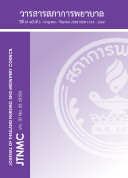Symptoms and Signs, Self-Management of Symptoms, and Emergency Department’s Management of Older Adults with Congestive Heart Failure
Keywords:
signs and symptoms, congestive heart failure, older adults, self-managementAbstract
Objective: To examine older adults’ symptoms and signs of congestive heart failure and self-management behaviour, as well as the emergency department’s management of such older adults
Design: Descriptive research
Methodology: The subjects were 163 purposively sampled older adults with congestive heart failure treated in the emergency department of a tertiary care hospital from February to May 2021. The research instruments consisted of: 1) a demographic data questionnaire; 2) a questionnaire on the signs and symptoms of congestive heart failure in older adults and their self-management behaviour; and 3) the emergency department’s records of management of the older adults during their visits. The data were analysed using descriptive statistics, including the frequency, percent- age, mean, and standard deviation.
Results: According to the findings, the five most common symptoms were orthopnea (83.44%), pitting edema (68.10%), dyspnea on exertion (66.26%), paroxysmal nocturnal dyspnea (PND) (61.35%), and chest pain (39.26%), respectively. The most common atypical symptoms were nausea (22.86%), dry cough (20.86%), fatigue (20.25%), decreased appetite (17.78), and loss of appetite (14.72), respectively. The majority of this subjects (92.21%) preferred sitting as a means of self-management, whilst about half (48.49%) chose to lie down with their heads elevated and less than one-fifth (16.36%) resorted to deep breathing. The emergency department’s primary means of managing the subjects were pharmacological treatment (100%) and oxygen therapy (72.08 %), respectively.
Recommendations: The results of this study suggested that the evaluation of clinical and atypical symptoms of heart failure in older adults are complex. Therefore, nurses should possess the necessary knowledge and competency in screening older adults with congestive heart failure according to their symptoms, to determine care priority and to give them and their caregivers proper advice on the signs, symptoms, and appropriate post-discharge self-management methods.
Downloads
References
Hoda B, Hummel S. Heart failure in older adults. Can J Cardiol 2016;32(9):1140-7.
Krittayaphong R, Karaketklang K, Yindeengam A, Janwanishstaporn S. Heart failure mortality compared between elderly and non-elderly Thai patients. JGC 2018;15(12):718–24.doi: 10.11909/j.issn.1671- 5411.2018.12.006.
Medical Records and Medical Statistics Service. Statistics of patients receiving services from the emergency department, Siriraj Hospital 2019; Bangkok. (in Thai)
Hofman M, Hanenberg F, Sierevelt I, Tulner C. Elderly patients with an atypical presentation of illness in the emergency department. Neth J Med 2017;75(6):241-6.
Yancy CW, Jessup M, Bozkurt B, Butler J, Casey DE, Colvin MM, et al. 2017 ACC/AHA/HFSA focused update of the 2013 ACCF/AHA guideline for the management of heart failure: a report of the American College of Cardiology/American Heart Association task force on clinical practice guidelines and the Heart Failure Society of America. J Am Coll Cardiol 2017;70(6):776–803.
Suwanrasamee W, Pinyophasakul W, Charoenkit W, Thumwiphat C. Experience of having symptoms, symptom management, and functional conditions in heart failure patients. Thai Journal of Cardio-Thoracic Nursing 2012;24(1):1-16. (in Thai)
Pirmohamed A, Kitzman D, Maurer M. Heart failure in older adults: embracing complexity. J Geriatr Cardiol 2016;13(1):8-14.
Perissinotto M, Ritchie C, Williams A, Chang A, Ahalt C, Chen H, et al. Atypical presentations of illness in older adults. Current Diagnosis & Treatment: Geriatrics. 2nd ed. McGraw-Hill Education; 2014.
Baron Franco B, McLean G, Mair FS, Roger VL, Guthrie B, Mercer SW. Comorbidity and polypharmacy in chronic heart failure: a large cross-sectional study in primary care. Br J Gen Pract 2017; 67(658): 314-320. doi:10.3399/bjgp17 X690533.
Lertpongpakpoom S, Phonphet C, Suwanno J. Factors predicting readmissions within one year after discharge from hospital with acute heart failure. Thai Journal of Cardio-Thoracic Nursing 2019;30(2): 126-40. (in Thai)
Department of Emergency Medicine, Faculty of Medicine Siriraj Hospital, Mahidol University. Guide to patient screening criteria. Bangkok. Faculty of Medicine Siriraj Hospital; 2015. (in Thai)
Phrommintikul A, Buakhamsri A, Janwanishstaporn S, Sanguanwong S, Suvachittanont N. Heart Failure Council of Thailand (HFCT) 2019 heart failure guideline: acute heart failure. J Med Assoc Thai 2019;102(3):373-9.
Yamane T. Statistics: An introduction analysis. 2nd ed. New York: Harper and Row Harper & Row; 1973.
Trongsakul S, Lambert R, Clark A, Wongpakaran N, Cross J. Development of the Thai version of Mini Cog, a brief cognitive screening test. Geriatr Gerontol Int 2015; 15(5), 594-600. doi:10.1111/ggi. 12318.
Murad K, Goff D, Morgan T, Burke G, Bartz T, Kizer J, et al. Burden of comorbidities and functional and cognitive impairments in elderly patients at the initial diagnosis of heart failure and their impact on total mortality: The cardiovascular health study. JACC Heart Fail 2015;3(7):542-50.
Mebazaa A, Yilmaz B, Levy P, Ponikowski P, Peacock F, Laribi S, et al. Recommendations on pre-hospital and early hospital management of acute heart failure: a consensus paper from the Heart Failure Association of the European Society of Cardiology, the European Society of Emergency Medicine and the Society of Academic Emergency Medicine–short version. Eur Heart J 2015; 36(30): 1958-66.doi:10.1093/eurheartj/ehv066.
Yodying W,Siripitayakunkit A, Sumdeangrit B, Puwanant S. Symptom cluster management strategies and outcomes in patients with heart failure. Chula Med J 2018;65(4):403-13. doi:10.14456/clmj. 2021.52.
Santos GC, Liljeroos M, Dwyer AA, Jaques C, Girard J, Stromberg A, et al. Symptom perception in heart failure - interventions and outcomes: a scoping review. Int J Nurs Stud 2020;116:103524. doi: 10.1016/j.ijnurstu.2020.103524.
Katsanos S, Bakosis G, Frogudaki A. Acute heart failure syndrome in the elderly. Contin Cardiol Educ 2017;3(3):93-9.
Teixeira A, Arrigo M, Tolppanen H, Gayat E, Laribi S, Metra M, et al. Management of acute heart failure in elderly patients. ACVD 2016;109(6): 422-30. https://doi.org/10.1016/j.acvd.2016.02.002
Storrow B, Jenkins A, Self H, Alexander T, Barrett W, Han H, et al. The burden of acute heart failure on U.S. emergency departments. JACC Heart Fail 2014; 2(3):269-77. doi: 10.1016/j.jchf.2014.01.006.
Peacock WF, Emerman C, Costanzo MR, Diercks DB, Lopatin M, Fonarow GC. Early vasoactive drugs improve heart failure outcomes. Congest Heart Fail 2009;15(6):256-64.
Downloads
Published
How to Cite
Issue
Section
License
Copyright (c) 2022 Thai Journal of Nursing Council

This work is licensed under a Creative Commons Attribution-NonCommercial-NoDerivatives 4.0 International License.








